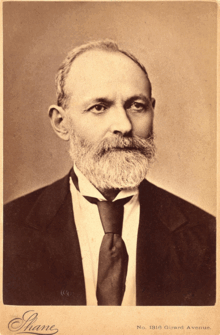Uriah Smith Stephens
Uriah Smith Stephens (born August 3, 1821 in Cape May , New Jersey , † February 13, 1882 in Philadelphia , Pennsylvania ) was a Baptist , American union leader and founder of the Knights of Labor .
Life
Nothing is known about Uriah Smith Stephens' childhood and his parents. He studied religion and wanted to be a Baptist minister. But due to the consequences of the economic crisis of 1837 he was forced to start an apprenticeship for financial reasons. He began an apprenticeship in tailoring , but tried part-time to continue his studies . But when he moved to Philadelphia in 1846, he broke off his studies completely. He worked in his trade as a tailor until 1853 and then went to California for five years . During this time he toured the West Indies , Central America and Mexico .
In 1858 he came back to Philadelphia. He joined the trade union movement, became a supporter of utopian socialism and, as a republican, an opponent of slavery . He supported the Republican presidential candidate John Charles Frémont in 1856 and Abraham Lincoln in 1860 .
In 1862 he joined the Garment Cutters 'Association and became an active member until it was dissolved in 1869. In the same year he invited eight colleagues from his profession to him, presented his plans and visions for a new workers' organization and founded the Noble and with them Holy Order of Knights of Labor , later renamed Knights of Labor . The assembly created a kind of secret society with rituals and confidentiality obligations.
Stephens was elected its Master Workman by the first general assembly of the Knights of Labor and, in 1878, its Grand Master Workman . In the same year he ran on the ticket of the Greenback Labor Party for the US Congress , but was not elected.
In 1879, after he had already resigned a year earlier, he gave up the chairmanship and was replaced by Terence Vincent Powderly .
Stephens died on February 13, 1882 in Philadelphia and was buried there in the Odd Fellows Cemetery .
In a token of gratitude and for his services, the General Assembly of the Knights of Labor in Richmond , Virginia in 1886 decided to build a house for the family to keep them safe.
Act
Stephens 'significant work was limited to the period from 1869, the founding of the Knights of Labor, to his resignation in 1879. His merit was to have founded a workers' organization that did not want to restrict itself as a union locally or regionally, and moreover open to all people who produced something, i.e. who participated in the value creation process of a product. This explicitly included business people, but expressly excluded bankers , speculators and brokers , for example .
Stephens was influenced by his very own religious mysticism and ideas of tradition , which were reflected in the rituals and secrecy rules celebrated by the Knights of Labor. He led the union in a kind of Masonic tradition that protected the organization and its members at the time and helped to survive in times when employers also used violence to break resistance .
Stephens was a very religious coined for the trade union movement visionary than that he would have masses can move. During the ten years of his leadership, the organization only grew by approximately 9,000 members, not to be compared with the approximately 700,000 members seven years later under the leadership of Terence Vincent Powderly.
When he tried in 1878 to run for a seat in the US Congress for the Greenback Labor Party, in which he was responsible for the word “laboratory” in his name, he was already showing a certain lack of interest in the specific trade union work. When Powderly took over the union leadership in 1879, Stephens immediately fell out with him, as he introduced radical changes to the Knights, opened the organization, abolished brotherhood rituals and banned the Noble and Holy Order of from the name.
Stephens remained an inactive member of the Knights until his death, but became alienated from the organization and the paths it had taken.
swell
- Gary M. Fink: Biographical Dictionary of American Labor Leaders , Greenwood Press, Westport, Connecticut, 1974. ISBN 0-8371-7643-3
- Biography - BookRags
- Norman J. Ware: The Labor Movement in the United States 1860-1895 (A Study in Democracy) , Vintage Books, Toronto, Canada, 1929.
- Melvyn Dubofsky, Foster Rhea Dulles: Labor in America - A History , Harlan Davidson Inc., Wheeling, Illinois, 2004. ISBN 0-88295-998-0
Further literature
- Melvyn Dubofsky: Industrialism and the American Worker 1865-1920 , Harlan Davidson Inc., Wheeling, Illinois, 1969. ISBN 0-88295-925-5
- Steve Leikin: The Practical Utopians - American Workers and the Cooperative Movement in the Gilded Age , Wayne State University Press, Detroit, 2005. ISBN 0-8143-3128-9
- Edward Pessen: Most Uncommon Jacksonians: The Radical Leaders of the Early Labor Movement , State University of New York Press, 1967. ISBN 0-8739-5129-8
| personal data | |
|---|---|
| SURNAME | Stephens, Uriah Smith |
| ALTERNATIVE NAMES | Stephens, Uriah |
| BRIEF DESCRIPTION | American union leader and founder of the Knights of Labor |
| DATE OF BIRTH | August 3, 1821 |
| PLACE OF BIRTH | Cape May , New Jersey |
| DATE OF DEATH | February 13, 1882 |
| Place of death | Philadelphia , Pennsylvania |
